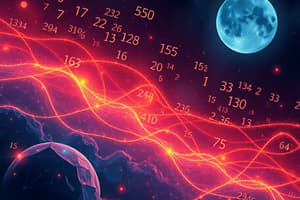Podcast
Questions and Answers
What are the rules of rounding off numbers?
What are the rules of rounding off numbers?
If the first digit to be dropped is less than 5, it and all following digits are dropped. If it is 5 or greater, all the following digits are dropped and the last retained digit is increased by 1.
What is rounding with magnitude?
What is rounding with magnitude?
When you round a large number, the correct magnitude is retained by replacing the dropped digits with placeholder zeros.
What are significant figures for multiplication/division?
What are significant figures for multiplication/division?
The final answer has the same number of significant figures as the measurement with the fewest significant figures.
What are significant figures for addition/subtraction?
What are significant figures for addition/subtraction?
What is an equality in metrics?
What is an equality in metrics?
What is a conversion factor?
What is a conversion factor?
Area of a rectangle is calculated using the formula: Area = ______ x ______
Area of a rectangle is calculated using the formula: Area = ______ x ______
Volume of a rectangular solid is calculated using the formula: V = ______ x ______ x ______
Volume of a rectangular solid is calculated using the formula: V = ______ x ______ x ______
Volume of a cube is calculated using the formula: V = ______^3
Volume of a cube is calculated using the formula: V = ______^3
Volume of a cylinder is calculated as V = ______D^2H/4
Volume of a cylinder is calculated as V = ______D^2H/4
1 L is how many mL?
1 L is how many mL?
1 qt is how many mL?
1 qt is how many mL?
1 qt is how many pt?
1 qt is how many pt?
1 in is how many cm?
1 in is how many cm?
1 lb is how many grams?
1 lb is how many grams?
1 kg is how many grams?
1 kg is how many grams?
1 m is how many cm?
1 m is how many cm?
1 lb is how many oz?
1 lb is how many oz?
Flashcards are hidden until you start studying
Study Notes
Rounding Rules
- If the first digit to be dropped is less than 5, drop it and the following digits.
- If the first digit to be dropped is 5 or greater, drop it and increase the last retained digit by 1.
Rounding with Magnitude
- To maintain the correct magnitude when rounding large numbers, replace dropped digits with placeholder zeros.
- Example: 3.8765 x 10^4 s rounded becomes 3.88 x 10^4 s.
Significant Figures: Multiplication/Division
- The final answer must have the same number of significant figures as the measurement with the fewest significant figures.
- Example: 0.024 x 4.620 / 3.44 = 0.033575581 rounds to 0.034.
Significant Figures: Addition/Subtraction
- The final answer should have the same number of decimal places as the measurement with the fewest decimal places.
- Example: 2.11 + 104.056 + 0.1205 = 106.2865 rounds to 106.29.
Equality
- A metric equality expresses a quantity in two different metric units.
- Example: 1 m = 1000 mm illustrates a conversion between meters and millimeters.
Conversion Factor
- A conversion factor is the ratio of two equivalent values expressed in different units.
- Example: 1 m = 1000 mm implies 1000 mm equals 1 m.
Area of Rectangle
- Area is calculated by the formula: Area = Length x Width.
Volume of Rectangular Solid
- Volume is computed using: V = Length x Width x Height.
Volume of Cube
- Volume can be determined using: V = L^3, where L is the length of a side.
Volume of Cylinder
- Volume of a cylinder is calculated with: V = πD²H/4 or approximately V = 3.14D²H/4.
- D represents the diameter while H is the height.
Metric Conversions
- 1 L = 1000 mL
- 1 qt = 946 mL
- 1 qt = 2 pt
- 1 in = 2.54 cm
- 1 lb = 454 grams
- 1 kg = 1000 grams
- 1 m = 100 cm
- 1 lb = 16 oz
Studying That Suits You
Use AI to generate personalized quizzes and flashcards to suit your learning preferences.




